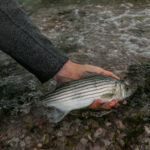
Louisiana Bull Reds Up for Harvest Again: H.B. 604 Must Not Pass
Photo Credit: Carter Abramson | Trevor Johnson Every now and then, we encounter something so
Herring at the Supreme Court?
How an Upcoming Decision Could Significantly Disrupt Fisheries Management and Federal Rulemaking:
This week The Supreme Court of the United States will hear oral arguments for two fisheries cases. In practice, however, these cases deal more with the separation of powers among our three branches of government (Legislative, Executive, and Judicial), specifically a 40-year-old legal doctrine known as the Chevron Deference. In simplest terms, this doctrine allows federal agencies to reasonably interpret federal laws (legislation) and create regulation, if the law is “silent or ambiguous” on the regulatory issue; explained another way, courts will defer to the agency’s reasonable interpretation and implementation.
The Plaintiffs in these cases—Loper Bright Enterprises vs. Raimondo and Relentless Inc. vs. Department of Commerce—are Atlantic herring fishermen claiming that the National Marine Fisheries Service (NOAA Fisheries) exceeded its authority by requiring industry funded monitoring. Atlantic herring are a critical forage in the Northeast, remain critically depleted, and the fishery has a long history of overfishing and incidental catch/bycatch. SCOTUS will not be ruling on NOAA Fisheries’ interpretation of the Magnuson Stevens Act with its industry funded monitoring rulemaking, but rather whether the court should overturn Chevron. Due to Chevron’s jurisprudence and practical utility, however, it’s safe to say that this case has immense implications extending far beyond the herring fishery.
The Chevron Deference
Back in 1984, SCOTUS heard Chevron U.S.A., Inc. v. Natural Resources Defense Council, Inc, a case regarding the Clean Air Act. Ultimately, this case established a legal test to determine when the court should defer to an agency’s interpretation, which is now one of the most important principles in administrative law.
“The scope of the Chevron deference doctrine is that when a legislative delegation to an administrative agency on a particular issue or question is not explicit but rather implicit, a court may not substitute its own interpretation of the statute for a reasonable interpretation made by the administrative agency. Rather, as Justice Stevens wrote in Chevron, when the statute is silent or ambiguous with respect to the specific issue, the question for the court is whether the agency’s action was based on a permissible construction of the statute” –Cornell Law School.
At the core of Chevron is Congress delegating authority to federal agencies with expertise to create regulations to carry out enacted laws. Some Chevron opponents claim that overturning the doctrine would restore a balanced separation of powers (weakening the executive branch and instilling more authority back to the legislative and judicial branches). While proponents of Chevron argue the doctrine affords agency expertise, rather than unelected judges, authority to reasonably interpret laws to implement complex, technical rulemaking.
We don’t want to go too much further into the politics or the various ideological camps on this issue; so, if you’re interested, embark on your own research journey—there is no shortage of literature on the topic. In this blog, we’ll try to stay in the world of fisheries management and the implications described below.
Herring Fishermen Plaintiffs’ Arguments
Loper Bright Enterprises and Relentless Inc—from New Jersey and Rhode Island, respectively—commercially fish for Atlantic herring and are the plaintiffs in front of this week’s SCOTUS case. The plaintiffs argue that NOAA Fisheries was not authorized to implement the 2020 Industry Funded Monitoring Program, which required certain commercial herring fishermen to pay for fisheries monitors on 50% of trips. That coverage was expensive for the fishermen and reduced their profits. NOAA Fisheries’ primary objective for this program was to “help reduce uncertainty around catch estimates in the herring fishery, especially catch tracked against haddock and river herring/shad catch caps.” Due to federal funding constraints, the program has been suspended since April 2023.
Lower courts ruled with the government, finding that NOAA Fisheries (through the Department of Commerce) correctly applied Chevron by reasonably interpreting the Magnuson Stevens Act. Subsequently, both plaintiffs appealed seeking certiorari (hearing from the Supreme Court).
SCOTUS, however, will be considering one question: “Whether the Court should overrule Chevron or at least clarify that statutory silence concerning controversial powers expressly but narrowly granted elsewhere in the statute does not constitute an ambiguity requiring deference to the agency.”
Implications for Fisheries Management
While this decision extends so much further than our expertise and traditional scope of discussion, we do feel compelled to shine a light on the major implications for fisheries management.The Magnuson Stevens Act is the preeminent fishing law in the country and a global model for effective fisheries management. The law established eight regional fisheries management councils to develop fishery management plans and comply with Magnuson’s ten national standards. While these standards are designed to apply to all US Fisheries, reasonable interpretation by the Councils and NOAA Fisheries is critical to ensuring sustainable, science-based fisheries management. Our fisheries are incredibly dynamic and support countless fishing communities; it is unreasonable to expect Congress—in its current inefficient state—or unelected Judges to answer ambiguous fishery management questions in a timely manner. NOAA Fisheries reasonably interpreting Magnuson is foundational to sustainable fisheries management. If that interpretation proves a violation of Magnuson, courts can, and have, overturned those decisions, but that is how the legal system works. Overturning the Chevron precedent could substantially disrupt our fisheries management framework. We’ll be paying close attention to this case as it unfolds and provide updates when available.

Photo Credit: Carter Abramson | Trevor Johnson Every now and then, we encounter something so

This past weekend, ASGA proudly sponsored the Dirty Carp Tournament in Louisiana — and no, you didn’t misread that.

After years of data pouring in from The Albie Project, advocacy, persistence, and support from

This morning, the Connecticut Environment Committee held a hearing on House Bill 6248, a bill
We rely on our members and donations to keep fighting for a sustainable tomorrow in marine conservation.
GIVE THE GIFT OF FISHERIES CONSERVATION THIS HOLIDAY SEASON. SHOP ASGA GOODS THAT FUND FISHERIES RESEARCH & ADVOCACY CAMPAIGNS
JOIN ASGA IN CALLING FOR CRITICAL MANAGEMENT ACTION AFTER YEARS OF SPAWN FAILURES & POOR MANAGEMENT.
By using this website, you agree to our use of cookies. We use cookies to provide you with a great experience and to help our website run effectively. To learn more, please review our privacy policy.
One Response
The Chevron case seems like an attempt by industry to re-draw the lines of authority and enforcement from agencies and back to congress and the judiciary. Why? Well, campaign contributions can be made legally to curry the favor of congress members and judges and thus, get the outcomes industry desires. Chevron strips authority and enforcement away from the agencies. Why does industry want that? Well, money cannot be directed by industry, not legally anyway to agencies or individual civil servants.
When we hear from certain politicians that they want to “kill bureaucracy” and “blow up” the so-called “Deep State”, this is exactly what they are talking about. Never mind that politicians are almost never skilled in sciences and engineering, and thus, have absolutely ZERO subject matter expertise in anything technical. Let’s face it: nearly all industries are technical at this point). Never mind that most bills are written by industry lobbyists, not congress or the judiciary. Seriously, does anyone want AOC or MTG weighing in on highly technical matters of science and engineering? Of course not. Their are both bloviating buffoons, just on opposite ends of the political spectrum. Everything Congress does is for politics and money. And they are grid-locked because of that basic fact. Nothing is done based on the actual science and engineering. And the courts… same thing. What they want most is to get the industry money into their coffers and kill the civil service, which is mostly apolitical, especially in the rank and file. This is a power and money grab, plain and simple.